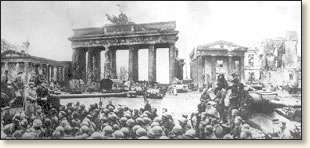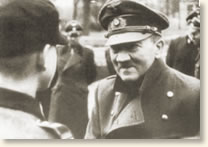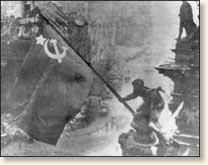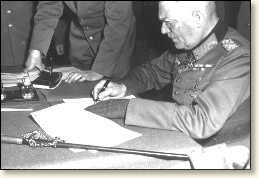|
The Battle of Berlin, 1945
The final chapter in the destruction of Hitler's Third Reich began on April 16, 1945 when Stalin unleashed the brutal power of 20 armies, 6,300 tanks and 8,500 aircraft with the objective of crushing German resistance and capturing Berlin. By prior agreement, the Allied armies (positioned approximately 60 miles to the west) halted
 |
Devastation in Berlin
Soviet troops at the Brandenburg Gate |
their advance on the city in order to give the Soviets a free hand. The depleted German forces put up a stiff defense, initially repelling the attacking Russians, but ultimately succumbing to overwhelming force. By April 24 the Soviet army surrounded the city slowly tightening its stranglehold on the remaining Nazi defenders. Fighting street-to-street and house-to-house, Russian troops blasted their way towards Hitler's chancellery in the city's center.
Inside his underground bunker Hitler lived in a world of fantasy as his "Thousand Year Reich" crumbled above him. In his final hours the Fuehrer married his long-time mistress and then joined her in suicide. The Third Reich was dead.
Dorothea von Schwanenfluegel was a twenty-nine-year-old wife and mother living in Berlin. She and her young daughter along with friends and neighbors huddled within their apartment building as the end neared. The city was already in ruins from Allied air raids, food was scarce, the situation desperate - the only hope that the Allies would arrive before the Russians. We join Dorothea's account as the Russians begin the final push to victory:
"Friday, April 20, was Hitler's fifty-sixth birthday, and the Soviets sent him a birthday present in the form of an artillery barrage right into the heart of the city, while the Western Allies joined in with a massive air raid.
The radio announced that Hitler had come out of his safe bomb-proof bunker to talk with the fourteen to sixteen year old boys who had 'volunteered' for the 'honor' to be accepted into the SS and to die for their Fuhrer in the defense of Berlin. What a cruel lie! These boys did not volunteer, but had no choice, because boys who were found hiding were hanged as traitors by the SS as a warning that, 'he who was not brave enough to fight had to die.' When trees were not available, people were strung up on lamp posts. They were hanging everywhere, military and civilian, men and women, ordinary citizens who had been executed by a small group of fanatics. It appeared that the Nazis did not want the people to survive because a lost war, by their rationale, was obviously the fault of all of us. We had not sacrificed enough and therefore, we had forfeited our right to live, as only the government was without guilt. The Volkssturm was called up again, and this time, all boys age thirteen and up, had to report as our army was reduced now to little more than children filling the ranks as soldiers."
"In honor of Hitler's birthday, we received an eight-day ration allowance, plus one tiny can of vegetables, a few ounces of sugar and a half-ounce of real coffee. No one could afford to miss rations of this type and we stood in long lines at the
 |
Hitler's last public appearance
the Fuehrer inspects boy-soldiers
defending Berlin April 20, 1945 |
grocery store patiently waiting to receive them. While standing there, we noticed a sad looking young boy across the street standing behind some bushes in a self-dug shallow trench. I went over to him and found a mere child in a uniform many sizes too large for him, with an anti-tank grenade lying beside him. Tears were running down his face, and he was obviously very frightened of everyone. I very softly asked him what he was doing there. He lost his distrust and told me that he had been ordered to lie in wait here, and when a Soviet tank approached he was to run under it and explode the grenade. I asked how that would work, but he didn't know. In fact, this frail child didn't even look capable of carrying such a grenade. It looked to me like a useless suicide assignment because the Soviets would shoot him on sight before he ever reached the tank.
By now, he was sobbing and muttering something, probably calling for his mother in despair, and there was nothing that I could do to help him. He was a picture of distress, created by our inhuman government. If I encouraged him to run away, he would be caught and hung by the SS, and if I gave him refuge in my home, everyone in the house would be shot by the SS. So, all we could do was to give him something to eat and drink from our rations. When I looked for him early next morning he was gone and so was the grenade. Hopefully, his mother found him and would keep him in hiding during these last days of a lost war."
"The Soviets battled the German soldiers and drafted
civilians street by street until we could hear explosions and rifle fire right
in our immediate vicinity. As the noise got closer, we could even hear the horrible
guttural screaming of the Soviet soldiers which sounded to us like enraged animals.
Shots shattered our windows and shells exploded in our garden, and suddenly the
Soviets were on our street. Shaken by the battle around us and numb with fear,
we watched from behind the small cellar windows facing the street as the tanks
and an endless convoy of troops rolled by...
It was a terrifying sight as they sat high upon their tanks with their rifles cocked, aiming at houses as they passed. The screaming, gun-wielding women were the worst. Half of the troops had only rags and tatters around their feet while others wore SS boots that had been looted from a conquered SS barrack in Lichterfelde. Several fleeing people had told us earlier that they kept watching different boots pass by their cellar windows. At night, the Germans in our army boots recaptured the street that the
 |
A Soviet soldier raises the
Hammer & Sickle atop the Reichstag |
Soviets in the SS boots had taken during the day. The boots and the voices told them who was who. Now we saw them with our own eyes, and they belonged to the wild cohorts of the advancing Soviet troops.
Facing reality was ten times worse than just hearing about it. Throughout the night, we huddled together in mortal fear, not knowing what the morning might bring. Nevertheless, we noiselessly did sneak upstairs to double check that our heavy wooden window shutters were still intact and that all outside doors were barricaded. But as I peaked out, what did I see! The porter couple in the apartment house next to ours was standing in their front yard waving to the Soviets. So our suspicion that they were Communists had been right all along, but they must have been out of their minds to openly proclaim their brotherhood like that.
As could be expected, that night a horde of Soviet soldiers returned and stormed into their apartment house. Then we heard what sounded like a terrible orgy with women screaming for help, many shrieking at the same time. The racket gave me goosebumps. Some of the Soviets trampled through our garden and banged their rifle butts on our doors in an attempt to break in. Thank goodness our sturdy wooden doors withstood their efforts. Gripped in fear, we sat in stunned silence, hoping to give the impression that this was a vacant house, but hopelessly delivered into the clutches of the long-feared Red Army. Our nerves were in shreds."
"The next morning, we women proceeded to make ourselves look as unattractive as possible to the Soviets by smearing our faces with coal dust and covering our heads with old rags, our make-up for the Ivan. We huddled together in the central part of the basement, shaking with fear, while some peeked through the low basement windows to see what was happening on the Soviet-controlled street. We felt paralyzed by the sight of these husky Mongolians, looking wild and frightening. At the ruin across the street from us the first Soviet orders were posted, including a curfew. Suddenly there was a shattering noise outside. Horrified, we watched the Soviets demolish the corner grocery store and throw its contents, shelving and furniture out into the street. Urgently needed bags of flour, sugar and rice were split open and spilled their contents on the bare pavement, while Soviet soldiers stood guard with their rifles so that no one would dare to pick up any of the urgently needed food. This was just unbelievable. At night, a few desperate people tried to salvage some of the spilled food from the gutter. Hunger now became a major concern because our ration cards were worthless with no hope of any supplies.
Shortly thereafter, there was another commotion outside, even worse than before, and we rushed to our lookout to see that the Soviets had broken into the bank and were looting it. They came out yelling gleefully with their hands full of German bank notes and jewelry from safe deposit boxes that had been pried open. Thank God we had withdrawn money already and had it at home."
 |
Field Marshall Keitel signs the surender terms
at Russian headquarters, Berlin May 9, 1945 |
"The next day, General Wilding, the commander of the German troops in Berlin, finally surrendered the entire city to the Soviet army. There was no radio or newspaper, so vans with loudspeakers drove through the streets ordering us to cease all resistance. Suddenly, the shooting and bombing stopped and the unreal silence meant that one ordeal was over for us and another was about to begin. Our nightmare had become a reality. The entire three hundred square miles of what was left of Berlin were now completely under control of the Red Army. The last days of savage house to house fighting and street battles had been a human slaughter, with no prisoners being taken on either side. These final days were hell. Our last remaining and exhausted troops, primarily children and old men, stumbled into imprisonment. We were a city in ruins; almost no house remained intact."
We thank Tricor Press for granting permission to reprint this eyewitness account
References:
Lawson, Dorothea von Schwanenfluegel, Laughter Wasn't Rationed (1999); Ryan, Cornelius, The Last Battle (1966).
How To Cite This Article:
"The Battle of Berlin, 1945," EyeWitness to History, www.eyewitnesstohistory.com (2002).
|






